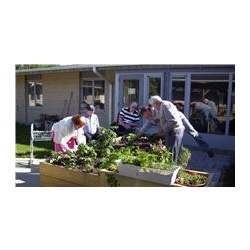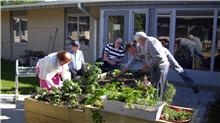
Luther professor and student launch horticulture program for residents of care center
Residents of a Decorah care center experienced those healing powers when they participated in a 12-week gardening project designed and conducted this summer by Stephanie Travers, Luther College assistant professor of psychology, and her summer research student Mitchell Demers, a senior psychology and health major from Rice Lake, Wis. Twelve Aase Haugen residents, ranging in age from 65 to 96, planted two vegetable gardens in raised beds. Along with tending these gardens, the groups also planted and cared for a variety of flowers, herbs and houseplants.
"Current research suggests that challenging activities help the elderly
strengthen aspects of memory," said Travers.
Over the course of 12 weeks, three groups of volunteer residents voluntarily participated in the horticulture study. Two groups participated in gardening and discussion activities. One group performed structured gardening activities and the other group chose their activities each week. A third group of residents participated in discussions only.
"We had predicted that gardening would provide the same benefits and help the residents improve their cognitive functioning abilities," said Travers."But we were surprised by the numerous ways this program affected the Aase Haugen community."
Susan Bjelland, the Aase Haugen executive director, and Darlene Juve,
activity director, were enthusiastic and very supportive of the project.
Many Aase Haugen staff and family members were curious and excited by this horticulture program. A number of the staff reports that the daily
experiences with the gardening project appear to have enhanced the
residents' sense of well-being by increasing their engagement with others and their involvement in the Aase Haugen community.
"Gardening also became a vehicle for community building," Travers said. "A sense of family developed among the participants -- even the group of residents that simply observed the activities. Besides taking part in the planned gardening activities, many chose to spend additional time in the courtyard together."
Travers said Demers was the driving force behind the student/faculty
collaboration.
"Gardening is something that was a big part of many of the residents' lives, and I believe it is important to make gardening once again accessible to them," said Demers.
He said the key to the success of the project was the raised gardens. He designed and constructed two handicap-accessible garden beds and planter boxes. He also paved adjacent areas so that the gardens were easily accessed by residents who use walkers or wheelchairs.
Demers said his motivation for the project stemmed from his experience as an intern with Green Chimneys Children Services in New York. There, in a residential school setting, he learned to incorporate horticulture directly into all aspects of young people's lives. He observed the positive effects of horticulture in fostering the youth's ability to socialize and work with others, and in building their self esteem.
As a result, Demers wanted to expand his knowledge and experience in
implementing horticulture programming could to promote well-being,
facilitating social interaction, and maintaining cognitive abilities for
nursing home residents.
"This project has been more than worthwhile," said Demers. "It is great to see the smiles, hear the stories and witness the positive impact
horticulture activities have on our elderly population."
The Luther College student/faculty collaborative research project was approved by the dean's office and funded by the Luther Wellness Program. Travers and Demers wrote a subsequent grant that received funding from The Depot Outlet that will enable the project to continue through the winter and into next year.
Travers and Demers noted that because the elderly population in America is growing rapidly the need for long-term care facilities is also rising. They believe that simply providing more buildings to accommodate older individuals is not sufficient.
"More must be done to ensure that our elders have comfortable homes and opportunities to lead full lives," said Travers.
"In addition to clean and bright facilities, consistent and caring staff,
and proper medical care, we should expect that residents will also have
daily access to a variety of activities that will engage and stimulate these
formerly active individuals. A horticulture-based program is a viable
option for an activity that can benefit the overall well-being of an elderly
population," she said.
Travers and Demers hope to make the gardening project a permanent program at Aase Haugen and hope that other care centers will see the importance and benefits from programs such as this one.
Travers intends to monitor the effects of the program over a period of
years. She believes it will make a significant difference in the quality of
life of care center residents.
Travers said she hopes to find that, over the long term, engaging in
gardening tasks may improve an aging person's mental acuity, help them maintain their manual dexterity, and generally improve their perception of quality of life. She is cautiously optimistic that, in some cases,gardening may even slow the progression of dementia.
Site designed and maintained by Iroc Web Design Services©.
Your Small Business Web Design Solutions.™




